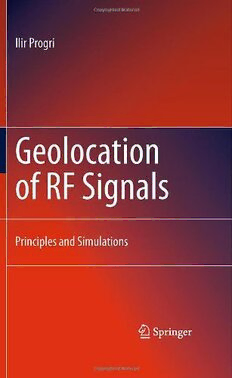
Geolocation of RF Signals: Principles and Simulations PDF
333 Pages·2011·10.128 MB·English
Most books are stored in the elastic cloud where traffic is expensive. For this reason, we have a limit on daily download.
Preview Geolocation of RF Signals: Principles and Simulations
Description:
Geolocation of RF Signals—Principles and Simulations offers an overview of the best practices and innovative techniques in the art and science of geolocation over the last twenty years. It covers all research and development aspects including theoretical analysis, RF signals, geolocation techniques, key block diagrams, and practical principle simulation examples in the frequency band from 100 MHz to 18 GHz or even 60 GHz. Starting with RF signals, the book progressively examines various signal bands – such as VLF, LF, MF, HF, VHF, UHF, L, S, C, X, Ku, and, K and the corresponding geolocation requirements per band and per application – to achieve required performance objectives of up to 0º precision. Part II follows a step-by-step approach of RF geolocation techniques and concludes with notes on state-of-the-art geolocation designs as well as advanced features found in signal generator instruments.Drawing upon years of practical experience and using numerous examples and illustrative applications, Ilir Progri provides a comprehensive introduction to Geolocation of RF Signals, and includes hands-on real world labs and applications using MATLAB in the areas of: RF signals specifications, RF geolocation distributed wireless communications networks and RF geolocation.Geolocation of RF Signals—Principles and Simulations will be of interest to government agency program managers industry professionals and engineers, academic researchers, faculty and graduate students who are interested in or currently designing, developing and deploying innovative geolocation of RF Signal systems.
See more
The list of books you might like
Most books are stored in the elastic cloud where traffic is expensive. For this reason, we have a limit on daily download.
